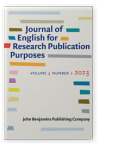Vol. 4:2 (2023) ► pp.164–188
Vol. 4:2 (2023) ► pp.164–188
A four-year trajectory of development from student to published researcher
Learning to collaborate in the research article genre
This case study tracks a multilingual writer’s academic writing, in particular her engagement in the research article (RA) genre, over the course of four years as she moved along a trajectory from a novice graduate student to a confident disciplinary writer. The theoretical framework draws from academic literacies (Barton & Hamilton, 1998), highlighting practice and disposition (Bourdieu, 1990) as a way of understanding engagement with the RA genre. The findings, based on an analysis of interviews conducted with the participant, reveal three stages of the participant’s development in her disposition toward the RA genre, all interspersed with affect. Each stage is illustrated through examples from the interviews. The study’s longitudinal design provides a novel perspective that brings out a dynamic picture of the development of a graduate student writer. The findings are discussed in light of previous research and pedagogical implications are set out.
Article outline
- 1.Introduction
- 2.Previous research into graduate students writing RAs
- 3.Theoretical framework
- 3.1The multiplicity of practices and writer dispositions
- 3.2Academic networks
- 4.Methods
- 4.1The participant and data collection
- 4.2Data analysis
- 5.Findings
- 5.1Stage 1: RA writing is about one’s command of English
- 5.2Stage 2: RA writing is about communication and compensatory collaboration
- 5.3Stage 3. RA writing is positively contributing to a collaborative process of co-construction
- 6.Discussion and conclusion
- Acknowledgements
-
References
